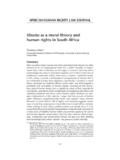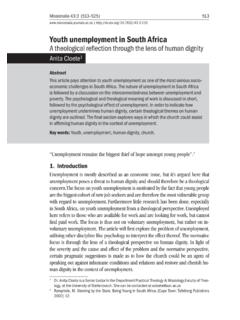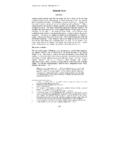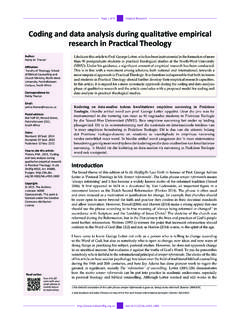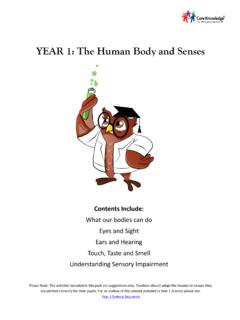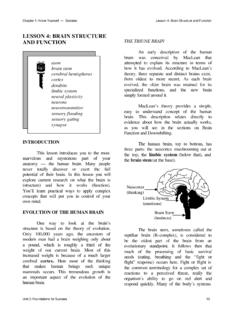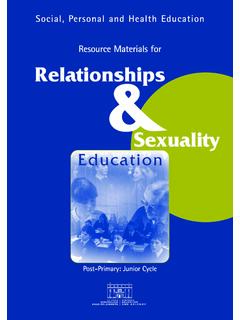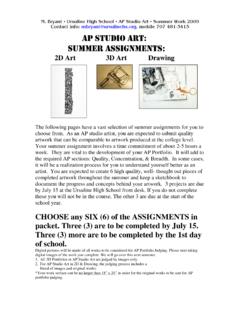Transcription of Introduction – Part II Decolonising the university ...
1 Introduction Part II. Decolonising the university curriculum given a dysfunctional school system? Jonathan Jansen I recently had occasion to visit one of the top girls' schools in Zimbabwe. This high school of young black women produced some of the leading graduates in the sciences and mathematics on the continent. Their matriculants could be found top of class in South Africa's leading research universities in math-requirement disciplines like actuarial science, human genetics and computer science. Since I was early I wandered through the school grounds and found myself in the simple but spacious school chapel. Behind the seats in every pew there was a Christian hymn book, as could be expected in an independent church school that survived both colonial rule and the nominally Marxist government following independence.
2 I sat down, opened the hymn book and there was the opening song: God save our gracious King'. If this school was in South Africa during the student protest movement, I thought to myself, there was a good chance the hymnals would be burnt, if not the chapel, in the name of decolonisation. That the school produced outstanding black graduates in challenging disciplines would be irrelevant. In the 2015 16 student protest movement on South African university campuses there was a short but intense period of demands for the decolonisation of former white institutions and, in particular, a call for the decolonisation of the curriculum. While the curriculum call was quickly superseded by more basic demands such as free higher education for all students, it left in its wake a series of institutional energies that took the original demand at its word.
3 An American foundation made millions available for decolonisation research and some of the more established universities brought to life curriculum committees to act on the demand for decolonisation. It was not surprising, therefore, that four of the six articles submitted to this Special Issue deal with the vexing problem of the curriculum question in South African universities. What is the significance of the call for the decolonisation of curriculum? Will it make a difference to the institutional curriculum? In other words, is the call 4 Journal of Education, No. 68, 2017. itself sustainable within the fast-changing agendas of student politics and the direction of government policy in relation to higher education? Or was the promise of a decolonial turn'1 merely a passing fad that offered a potentially exciting moment in the politics of knowledge but one that would like so many other earlier initiatives collapse under the weight of curriculum stasis?
4 Lis Lange, in this collection, takes the long view. As she correctly notes, a series of curriculum reforms since the 1990s changed the exoskeleton of the curriculum but left the soft and sensitive inner parts the endoskeleton . That outer frame of changes came down to refined debates about learning outcomes tailored to the production of high-level skills for economic growth. There would be a progressive, ladder-like qualifications structure that would allow enable seamless passage for workers from sweeper to engineer, in the heady language of those times. The policy goals of the new country were breathtaking in their ambitions but as Lange concludes, nothing fundamentally changed in terms of the substance (content, pedagogy, assessment) of curriculum.
5 In her telling of the curriculum narrative, the enormous investment in a national qualifications framework, and its exit-level outcomes, would come to be replaced by more immediate and practical'. concerns about efficiency addressing the low throughput and graduation rates of university -enrolled students. What Lange does not address is why this was the case; that is, was the real curriculum debate simply deferred for the sake of the transitional peace or was the transformation of knowledge assumed to be part and parcel of these union-inspired policy reforms focused on workplace transformation? That there is a knowledge problem in South African universities is not in Long before some students raised the flag about decolonisation' of the curriculum various scholars had made the point repeatedly that the 1.
6 It is Saleem Badat who boldly inserts the term into the ferment of debates on the transformation of higher education in the wake of the student protest movement; Badat, S. (2017) Trepidation, longing, and belonging: Liberating the curriculum at universities in South Africa, university of Pretoria, Public Lecture Series on Curriculum Transformation Matters: The Decolonial Turn, 10 April. 2. For the first use of the metaphor, see Jansen (2009), Knowledge in the Blood, Stanford, California: Stanford university Press, 3. Jansen, (2017b), The lost scholarship of changing curricula, South African Journal of Science, 113 (5,6). Jansen: Decolonising the university curriculum.. 5. institutional curriculum remained Sayed and others, in this volume, argue that position in relation to teacher education curricula across a sample of South African universities.
7 The curriculum problem matters in terms of content and its relevance to African conditions but also because of the ethnocentric character of curriculum authorship; in other words, who teaches what to whom and where raising, in the last instance, the institutional complexity (or what they call multi-layered struggles') under which curriculum change is pursued. In other words, curriculum transformation is limited by institutional conditions like the decline in state funding and the prior socialisation of academic teachers. What is required, these three authors argue, is a much more expansive imagination' when it comes to thinking about curriculum work. Brenda Leibowitz takes up this challenge with her review of a powerful set of concepts for the re-imagination of curriculum thought and practice.
8 For her the social realist' position on knowledge and curriculum is the problem; she charges social realism with separating knowledge from doing, learning from experience, and cognition from emotion. In its place Liebowitz argues for cognitive justice a normative position that advances the equal treatment of all forms of knowledge. The domination of Western knowledge, she insists, has marginalised, even museumified, alternative knowledges. We take as self-evident the organising principles and internal logics of dominant knowledge formations across the disciplines. Recognising other knowledge forms, bringing them into dialogue and tying these to an ethical commitment, such as social justice, not only broadens the knowledge repertoires available to students but remedies vital absences from the public curriculum.
9 While these conceptual forays into curriculum thought are invaluable in the present period, students on Monday morning still show up for classes and this is where Eunice Nyamupandengu takes off in her contribution to this edited collection of journal articles. An academic teacher of genetics, the author decides to open up what she calls social dialogues' with her students. Her opening question in the engagement with students is as simple as it is rare among university teachers anywhere: What do you expect from me as your lecturer for this genetics course? Student expectations are, unsurprisingly, concerned with the practical and the immediate to know what will be taught 4. Jansen, (2009); see also M. Mamdani (1998) Is African Studies to be turned into a new home for Bantu Education at UCT?
10 Social Dynamics, 24(2), 63 75. 6 Journal of Education, No. 68, 2017. and to be well-taught and fairly assessed. Nyamupandengu is concerned with how her very diverse body of students can access specialist ideas or epistemological knowledge, as she calls this borrowed term. In lectures and the laboratories, how can students access and command complex knowledge in the field of genetics? To answer such questions, she asks her students. These four contributions add value because they enter the debate from very different vantage points as a curriculum developer (Liebowitz), a policy maker (Lange), a geneticist (Nyamupandengu) and as teacher educators (Sayed et al.). They each define curriculum differently and give differential weight to discussions about the theoretical and the practical when it comes to decolonisation.
